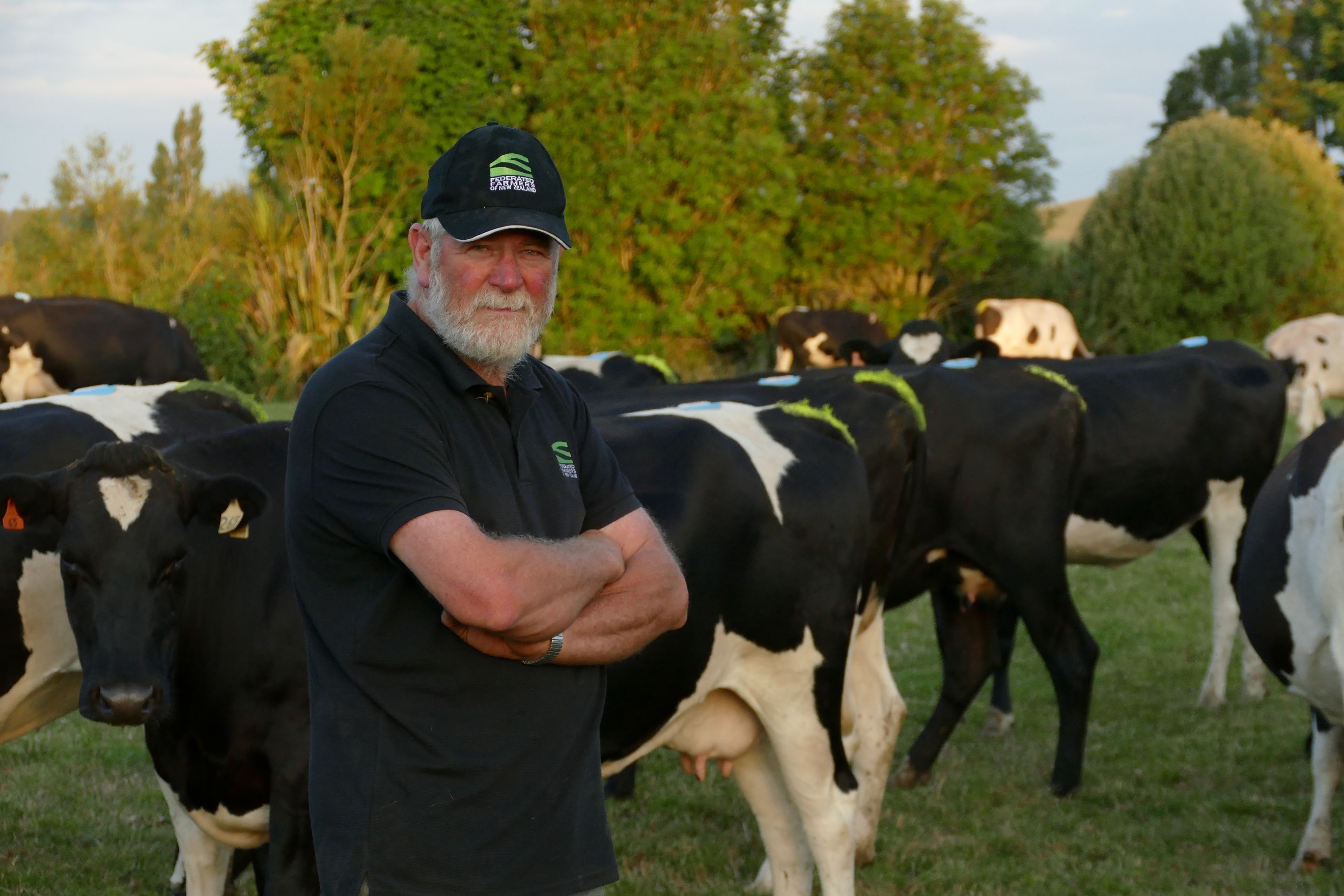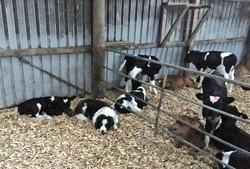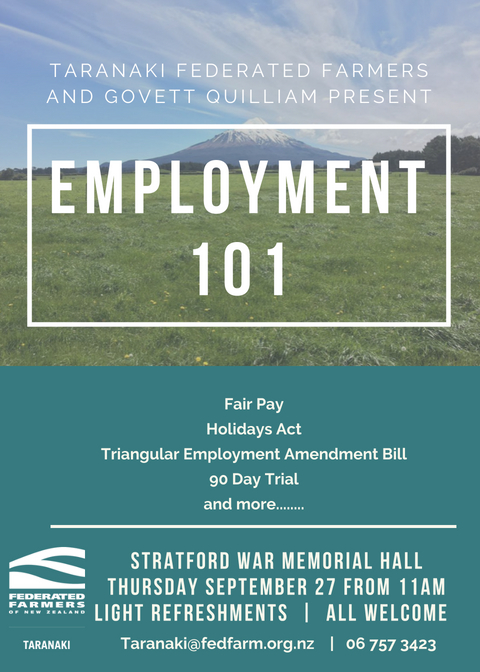September 2018
Welcome to the September edition of the NAKI NEWS

|
Donald McIntyre
Provincial President
Federated Farmers Taranaki
M: 027 248 0099
E: [email protected] |
sp
My, what a difference a year makes to the weather. Remember last year when it was continuous rain, not much sun and bloody miserable. This year is a whole lot nicer - sunshine, not too much rain, not too much mud… it might even be worthwhile being a farmer this year.
We as carers of the land know that the expectations and the gaze of the urban folk are upon us. We have seen in recent times photos taken by “SAFE” in an effort to dis-credit farmers and the farming of animals. Their cause is helped by naive sub-editors who know nothing about farming or animal husbandry and write headlines that are inaccurate and misleading. If you have road frontage on your farm be aware that you are always on show and with drones and high-powered lenses on cameras, these days not much is out of view - be careful.
For those of you diligently going through your emails at this time of year and reading the Fed’s Friday Flash (24/8/18) you will have seen that there are a whole lot of new Animal Welfare regulations coming into force on 1st October 2018. If you missed the Friday Flash visit Fed's
webpage here .
In brief, some of the things to be aware of are: Collars and tethering, use of electric prodders, supplying stock for transport, vet certificates- ingrown horns, lame animals, late pregnancy, injured or diseased udders, cancer eye, transport of calves less than 14 days old, use of traction in calving, docking cattle’s tails and castrating cattle over 6 months. In terms of working dogs - muzzles, shade and shelter, dogs on moving vehicles, tail docking and removal of dew claws. There is a lot more detail on these items on the
MPI website if you require it. Fed's also have a Factsheet available
click here .
As with all regulations there are fines for non-compliance. They start at $300 for minor breaches through to $25,000 for major offences by a body corporate, plus the bad publicity it gives to our industry, so PLEASE BE AWARE.
The regulations to do with de-budding calves with anaesthetic do not come into force until 1 October 2019 to allow more time for operators to become certified to deliver the anaesthetic. Check with your vet for more details.
There are a lot of people having talks with their bank managers. The banks all seem to be seeking to have clients starting to re-pay debt and live within their covenants. After the last few years of low pay out, drought and wet winters it has been tough to keep your bank happy, so keep talking with your accountant and your bank manager to work your way through any issues. If you need any other help, talk to the Rural Support Trust for advice.
With a bit of sun and the grass starting to grow we could be in for at least an ordinary season with plenty of lambs and milk.
A mention from Mark Hooper - Dairy Vice Chair
Heading into the first few days of September, spring conditions are somewhat mixed and pasture covers quickly swing from promising to threateningly low. Overall the reasonably favourable winter has helped improve cover despite the low levels of supplement available following last season’s shocker. Here’s hoping the favourable conditions prevail for spring also.
Hopefully new (or existing) on-farm labour arrangements have likewise been favourable through this busy period. For some of you this month will mark the end of probation periods for new employees and that’s a good time to sit down together, review your contracts and offer up a bit of encouragement and reward as appropriate. If this is the case and you want to upskill yourself around employment obligations or things have not gone so well and you have questions about your options, we encourage you to get along to our ‘Employment 101’ seminar later this month. The employment specialists from Govett Quilliam will be happy to answer any queries you have and a full selection of our current employment contracts will be available for sale on the day.
If your interest is more around contract milking, separate seminars on this topic will be held later in the year. Recently Taranaki Feds took part in a contract milking stakeholders’ workshop. This included DairyNZ, Primary ITO, Dairy Women’s Network and other parties connected with current or future contract milkers. The aim was to develop a combined industry strategy to help ensure all parties involved in contract milking are well informed, understand the contracts and that this important stepping stone in career progression is a win/win for all involved. As a part of achieving this Federated Farmers is developing a new ‘hybrid’ contract, i.e. A combined contract milking/ lower order sharemilker contract. This will in due course replace the existing lower order sharemilking contracts and offer more flexibility and yet better protection for contract milkers. A legislative change is required for this to be enacted and we will keep you informed on progress. Meanwhile, as I mentioned above, keep a lookout for more information on the combined industry strategy in this space.

Spot the odd one out - Sharemilker Chair Matthew Herbert's border collie, Rufus, decided that the calf pen was a damn good spot for an afternoon nap.
In the news – Janet Schultz
NZ is known for its dairy products, and is home to one of the biggest dairy companies in the world.
It's a practice often questioned by non-farmers but separating newborn calves from their mothers is better for the animals, a dairying leader says.
Janet Schultz, Federated Farmers Taranaki dairy chairwoman, said although taking calves from their mothers might appear cruel, it was necessary for the health of the animals and the industry.
Schultz said cows experienced the same discomfort as human mothers when their milk came in and a calf couldn't drink enough to relieve the pain.
"You'd do anything to relieve that pressure but cows can't," she said.
"Milking them takes that pain and pressure away."
While a cow could have 20 to 25 litres of milk in her udder, calves could only drink about five litres, Schultz said.
"At the end of the day, the cow is producing so much milk, if she's not taken away and milked she's at risk of getting mastitis."
A potentially fatal inflammatory reaction in the udder tissue, mastitis is the most common disease in New Zealand dairy cattle. It can cost the industry up to $280 million a year in treatment, loss of milk production, labour, discarded milk and culling.
To read more of this article, head to our Taranaki Federated Farmers Facebook page, or
click on this link

The big kids enjoying the Taranaki spring sunshine with Mt Taranaki in the background.
Policy update – Lisa Harper
It’s been relatively quiet this month, with just further submissions due on TRC’s Coastal Plan. We did the main submission back in March. The issues were public access across farms to the coast and new regulation to protect ‘surfing zones’ (which strangely included coastal farmland).
Doing a ‘further submission’ is a chance to support or oppose points in other submissions. It’s important because if anything ends up in Court later, you can only be involved if you’ve raised that issue in one of your submissions.
On the road – Craig Sole
Be careful out there - the facts and figures from ACC and WorkSafe show that the primary sector is one the most dangerous in New Zealand. There have been improvements, but we have a long way to go.
I hear it a lot on the road - “Hey its common-sense” or “We are sick of this all this compliance”, however, I urge you to keep your family, your employees and yourself safe on farm.
- Vehicle fatalities - 101 between 2013 – 2018, not just on quad bikes but tractors and other forms of transports involved.
- Sadly between 2011 – July 2018, 132 people have died while working on farms and that’s among the highest for all industries. We all want our family members to come home safely.
- Injuries – many people are employed in the Ag sector but 2053 personnel are injured per 100,000 Ag workers per year – that a lot time and injuries to staff, workers and families. Another way to look at this – per 1000 employees in Ag Sector, 20 suffer an injury requiring more than one week off.
Raise the issue and awareness to staff and family. As members you have a Farm Safety Management system available, but also support through our 0800 services and we look to continual improvement and a safe work environment.
DIARY DATES
September 10
Taranaki Provincial Executive meeting
On Farm Safety - From 11am
September 27
Employment 101
Stratford War Memorial
From 11am - refreshments provided

Thank you to our provincial sponsors
